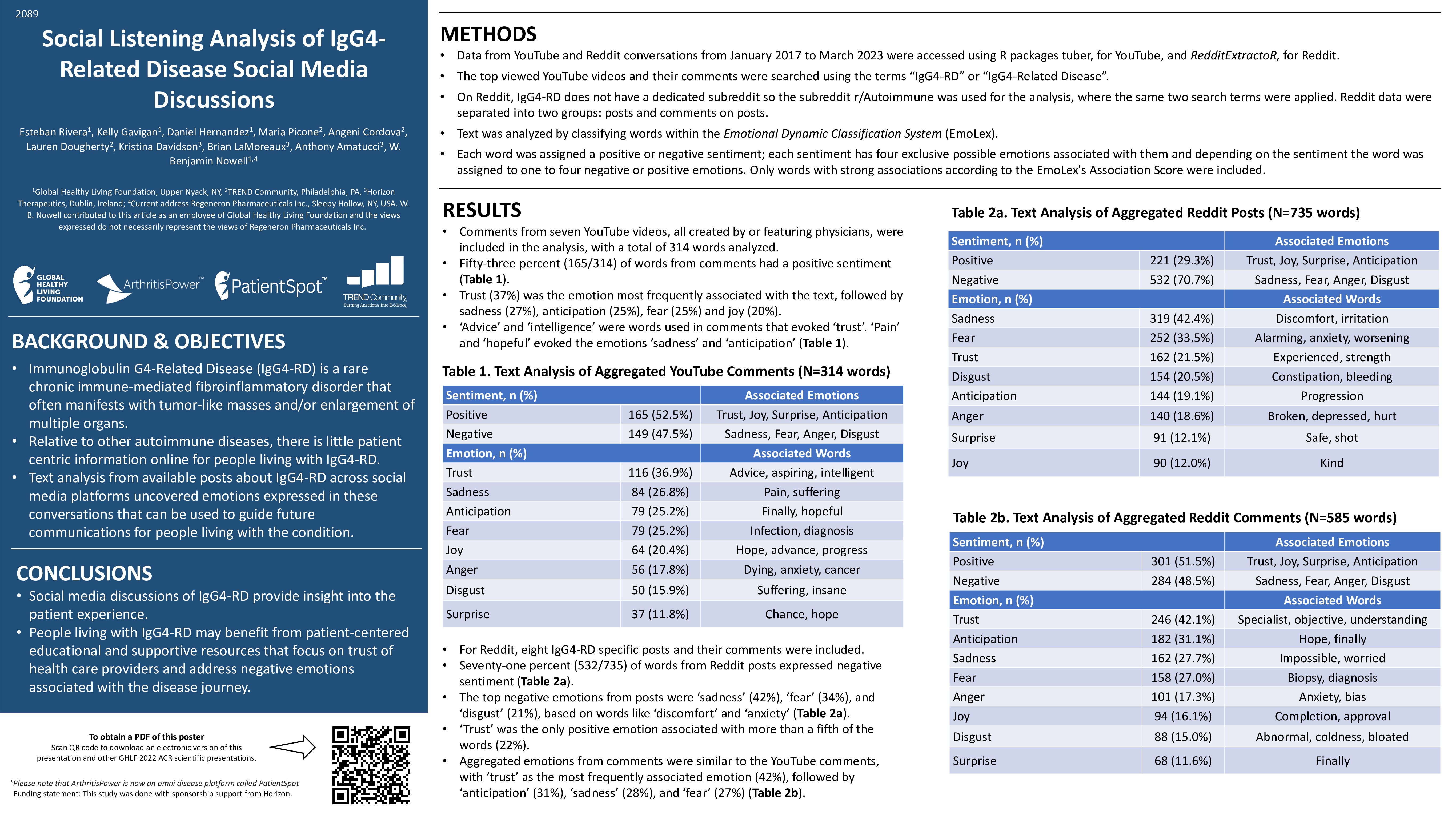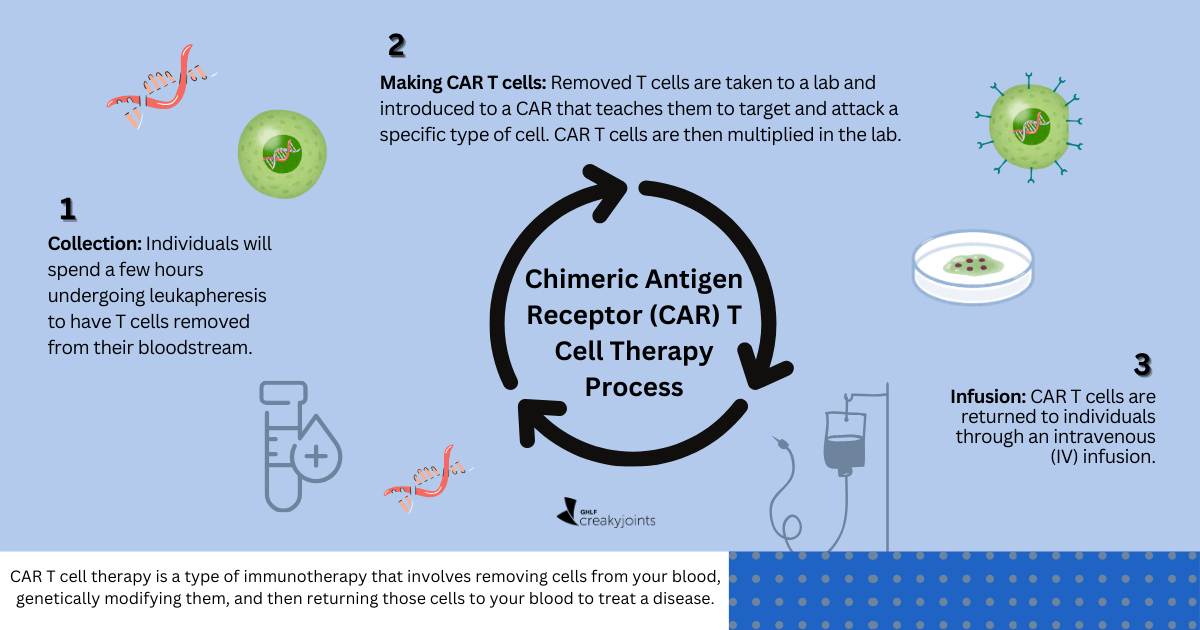

A new study, “Social Listening Analysis of IgG4-Related Disease Social Media Discussions,” which is being presented at the annual meeting of the American College of Rheumatology 2023 (ACR Convergence) in San Diego, CA, is providing insight into the patient experience of those living with Immunoglobulin G4-Related Disease (IgG4-RD).
A rare chronic immune-mediated fibroinflammatory disorder, IgG4-RD can present itself in several ways, but some of the most common are tumor-like masses or painless enlarged organs. IgG4-RD can affect up to 10 to 12 organs. Depending on which organ(s) is affected, symptoms and disease activity may vary. Many patients go months to multiple years without any symptoms.
Despite the lack of symptoms, unrecognized organ damage can still occur, resulting in the need for immediate medical attention. It is often treated with glucocorticoids (prednisone), although rituximab is frequently used off-label as an investigational therapy that involves B-cell depletion. Several drugs are under clinical trial for IgG4-RD.
About the Study
The study, which was conducted by The Global Health Living Foundation and TREND Community, used machine learning to analyze underlying emotions behind words used by people participating in conversations on YouTube and Reddit from January 2017 to March 2023.
For YouTube, 314 words were analyzed across seven videos.
The words were limited to comments on videos specifically about IgG4-RD resulting from the search “IgG4-RD” or “IgG4-Related Disease.” The videos were primarily posted by rheumatologists, but also included verified accounts focused on providing videos about health topics, including but not limited to IgG4-RD. The nature of these videos was educational. They provided reliable information about the disease, including prognosis and treatment.
Analysis of Reddit conversations using the same search terms included two groups: posts and comments. Reddit analysis included eight posts, with 753 words from the original post, and 585 from the comments section of those posts. Those who submitted posts to the r/Autoimmune subreddit had either recently been diagnosed with IgG4-RD or sought information on getting a diagnosis.
Words were generalized into positive or negative sentiment. Within each sentiment, a word could be assigned one of four emotions.
Key findings on YouTube included:
- Just over half (53%) of words had a positive sentiment, with the emotion trust (37%) being the most frequent emotion associated with the words.
- Words such as advice and intelligence were words used multiple times that evoked positive sentiment.
- Other than trust, anticipation (25%) and joy (20%) were common positive emotions.
- The most common negative emotion was sadness — pain and suffering were a few words associated with the emotion.
Key findings on Reddit included:
- Among the 753 words on posts, 71 percent expressed negative sentiment — significantly higher than both YouTube and Reddit comments. Much of that was due to words like anxiety, discomfort, and irritation being frequently used to evoke emotions such as sadness (42%) and fear (34%).
- Reddit comments in response to these posts were similar in sentiment (51.5% positive) to that of YouTube.
- Trust was also the most frequently associated emotion (42%).
Trust emerged as the most common emotion across all platforms and groups. On YouTube, trust likely stemmed from patients having confidence in the individuals who published the videos, like rheumatologist or verified health accounts.
Trust on Reddit was related to finding a community of people with similar lived experiences. However, the negative emotions portrayed by those posting on Reddit while looking for this community demonstrates an urgent need for patient-centric information about the disease journey for those living with IgG4-RD.
What This Means for You
If you or someone you care about is living with IgG4-RD, it’s important to acknowledge that, compared to other autoimmune diseases, there are limited conversations that exist online. However, these findings are helpful in understanding how patients in the IgG4 community think and feel about their experiences.
“Social listening is a powerful tool for researching rare diseases because it allows us to tap into the collective wisdom and experiences of patients,” says co-author Kelly Gavigan, MPH, Director, Research and Data Science, at GHLF. “In the world of chronic illness, community is everything. It’s where we find understanding, support, and hope.”
The negative sentiments expressed in the Reddit posts suggest there is an unmet need in this community when it comes to resources available to guide them in their journeys. Specifically, patient-centered information about common symptoms, diagnosis, and treatment can help people living with IgG4-RD (and their loved ones) ease their fears and questions regarding how the disease can potentially affect their lives.
On the other hand, the positive sentiment found in YouTube videos underscores the value of the doctor-patient relationship in enhancing the patient experience.
“By considering both the negative and positive sentiments, we gain invaluable insights that will inform the development of patient-centered education and support materials,” says Gavigan. “We uncover valuable insights that can shape research, improve trust with providers, and ultimately, bring people with IgG4-RD closer to a better quality of life.”
The Health Advocates
Listen to Niki C. Beamon share her 17-year journey toward an IgG4-RD diagnosis on the latest episode of The Health Advocates, a podcast that breaks down major health news of the week to help you make sense of it all. Listen now.
This article was made possible with support from Horizon Therapeutics.
Rivera E. Social Listening Analysis of IgG4-Related Disease Social Media Discussions [abstract]. Arthritis & Rheumatology Journal. 2023. https://acrabstracts.org/abstract/social-listening-analysis-of-igg4-related-disease-social-media-discussions/.





